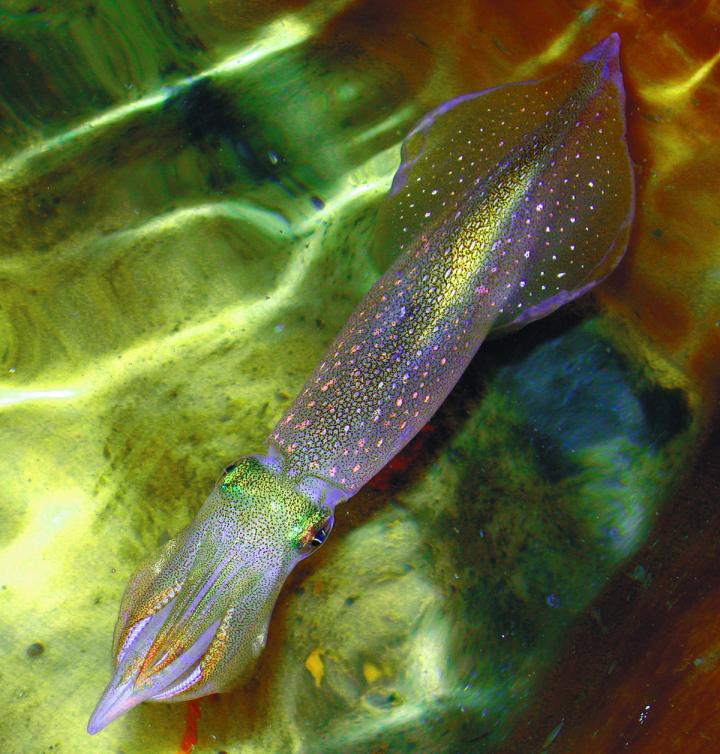Squid enrich their DNA 'blueprint' through prolific RNA editing

The squid is a prolific editor of genetic information, a new study finds. Credit: Elaine Bearer
One insight into this question has also turned out to be surprising. Contrary to the classical “central dogma” of molecular biology, genetic information does not always pass faithfully from genomic DNA to messenger RNA to the synthesis of proteins.
Rather, the information can be significantly altered along the way by a variety of means, including by precision “editing” at the RNA stage to fine-tune the type of proteins that will be produced.
RNA editing was thought to be sparingly used, based on a limited number of studies in mammals and flies. But recently, MBL Whitman Investigator Joshua Rosenthal and colleagues discovered the most prolific usage yet of RNA editing in the common squid, Doryteuthis pealeii, a behaviorally sophisticated marine organism that has long been prized for studies of the nervous system.
By comparing DNA and RNA sequences from the squid brain, the team found that 60 percent of the RNA transcripts had been edited. (A transcript is a stretch of DNA transcribed into an RNA molecule.) This is orders of magnitude more “recoding” of the genetic instructions than has been seen in any other species to date, says Rosenthal, a professor of neurobiology at the Universidad de Puerto Rico.
The 57,000 recoding sites they found in the squid brain (as compared with 100 known recoding sites in humans and 600 in the fruit fly) created tremendous protein diversity, suggesting an important role for RNA editing in the brain physiology of the squid. It may, for example, enable squid to fine-tune its physiological response to environmental variables, such as changes in temperature, a hypothesis that Rosenthal will be exploring this summer at the MBL.
“In squid, RNA editing is so pervasive that the central dogma should be modified to include this process,” Rosenthal says. “These results open the possibility that, in many organisms, extensive recoding is a common means of creating functional diversity.”
###
Citation:
Alon S et al (2015) The majority of transcripts in the squid nervous system are extensively recoded by A-to-I RNA editing. eLife 10.7554/eLife.05198
The Marine Biological Laboratory (MBL) is dedicated to scientific discovery and improving the human condition through research and education in biology, biomedicine, and environmental science. Founded in Woods Hole, Massachusetts, in 1888, the MBL is a private, nonprofit institution and an affiliate of the University of Chicago.
Media Contact
All latest news from the category: Life Sciences and Chemistry
Articles and reports from the Life Sciences and chemistry area deal with applied and basic research into modern biology, chemistry and human medicine.
Valuable information can be found on a range of life sciences fields including bacteriology, biochemistry, bionics, bioinformatics, biophysics, biotechnology, genetics, geobotany, human biology, marine biology, microbiology, molecular biology, cellular biology, zoology, bioinorganic chemistry, microchemistry and environmental chemistry.
Newest articles

Silicon Carbide Innovation Alliance to drive industrial-scale semiconductor work
Known for its ability to withstand extreme environments and high voltages, silicon carbide (SiC) is a semiconducting material made up of silicon and carbon atoms arranged into crystals that is…

New SPECT/CT technique shows impressive biomarker identification
…offers increased access for prostate cancer patients. A novel SPECT/CT acquisition method can accurately detect radiopharmaceutical biodistribution in a convenient manner for prostate cancer patients, opening the door for more…

How 3D printers can give robots a soft touch
Soft skin coverings and touch sensors have emerged as a promising feature for robots that are both safer and more intuitive for human interaction, but they are expensive and difficult…





















